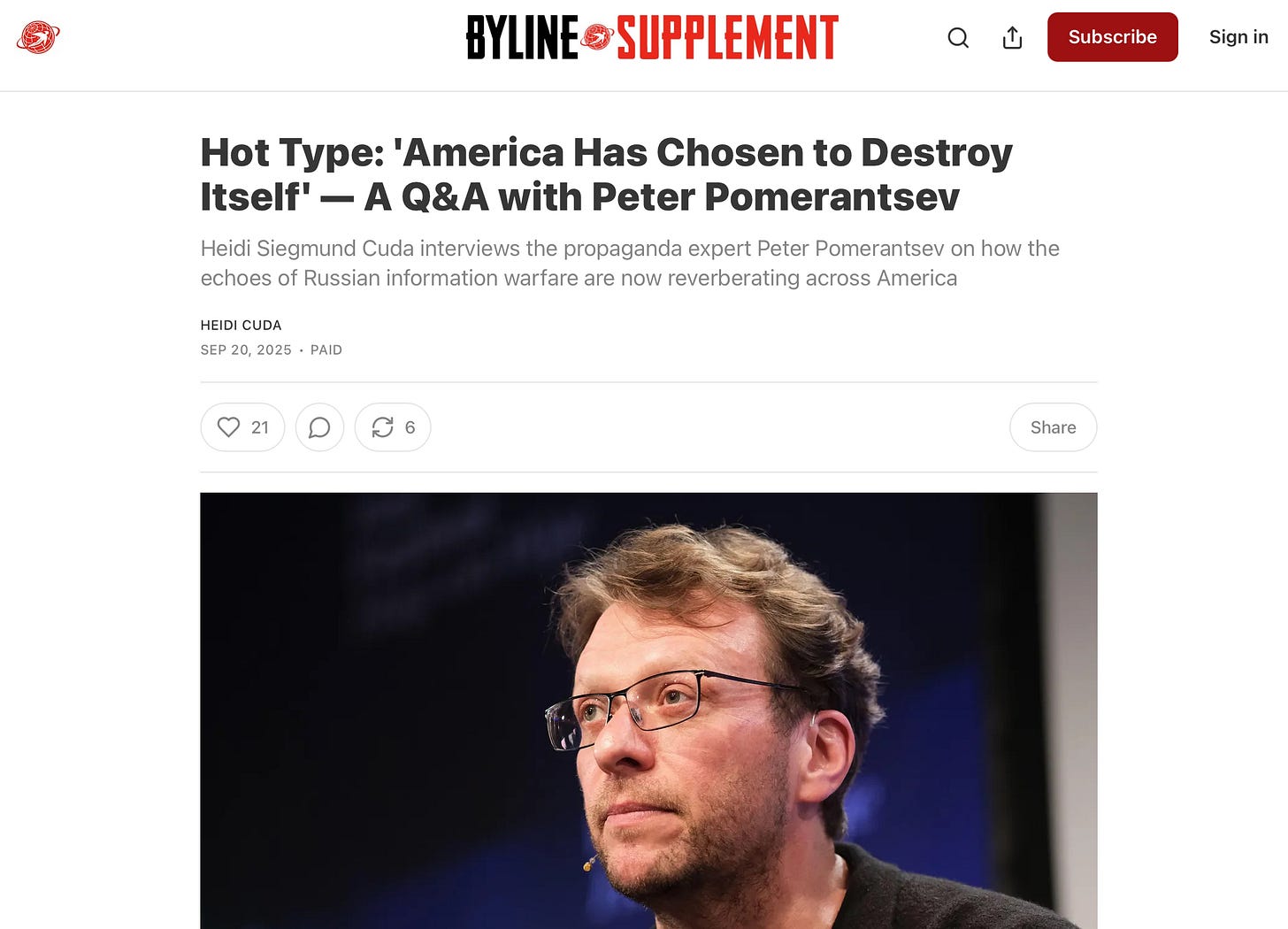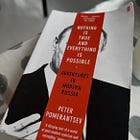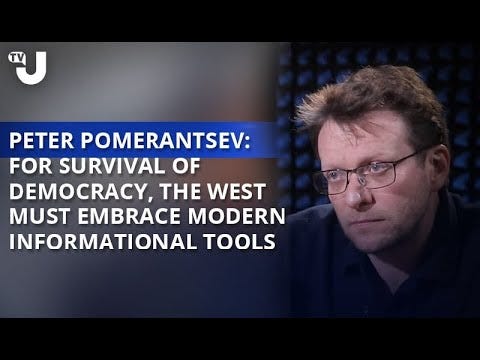‘America Has Chosen to Destroy Itself’ — My Latest Hot Type Column in Byline
For this week’s Hot Type column in Byline Supplement, I run excerpts from RadPod’s latest interview with Russian propaganda expert Peter Pomerantsev
***Please take out a membership to support the light of truth.***
If you haven’t yet had a chance to watch Peter Pomerantsev’s interview with RadPod, please do:
I took on the daunting task of trying to distill our hour-long interview with the author into a Q&A with his most salient points — the subject of this week’s Hot Type column in Byline Supplement:
Some of it’s tough medicine, all of it vitally important.
Core themes:
America could have — at any time — chosen to fight back against the onslaught of narrative warfare but didn’t. It simply wasn’t profitable;
Thinking that lies were the problem was a misdiagnosis — it was about the construction of identities then used to dehumanize the ‘other’;
When there’s no market for truth and no shame in lies, conspiracy takes on as great a value as scientific fact;
Destroying the concept of truth with cynicism paved the way for unbridled aggression and toxic tribalism;
The way out requires collaboration among nation states, some businesses, and a few brave philanthropists. Polling suggests ‘big interventions’ and working together is actually what people want.
As always, thank you to everyone who supports the work we do at Byline Supplement — it means a great deal to those of us on the frontline of independent investigative reporting. If you are not yet a member of Byline, and you would like to read any of my paywalled columns in full, please reach out to me at bettedangerous/gmail.
Below is an excerpt from this week’s column:
Hot Type: 'America Has Chosen to Destroy Itself' — A Q&A with Peter Pomerantsev
Heidi Siegmund Cuda interviews the propaganda expert Peter Pomerantsev on how the echoes of Russian information warfare are now reverberating across America
An Excerpt from Byline Supplement
“What we're dealing with, whether historically or now, is the construction of identities and stories that lead to the destruction of democracy and ultimately, terrorism, war and violence.”—Peter Pomerantsev
Author Peter Pomerantsev spent a decade working in Russia during its rise into a modern propaganda powerhouse. In his books about contemporary and historical propaganda, he warned democratic nations that this stuff was poison. He literally handed over the recipe of how propaganda bombs were made and told us what their devastating impacts would be when detonated in target nations.
So we can’t say we weren’t warned. But we did ignore those warnings. In the US, a country where large swaths of the population have completely lost interest in truth, no one at a government level put up a fight, because it simply wasn’t profitable, says Pomerantsev.
In this Q&A derived from a podcast interview I conducted with Pomerantsev last Sunday, he breaks down how democratic nations misdiagnosed the Great Propaganda Wars, but how any billionaire who wants to fund the fight back, can still do it.
Heidi Siegmund Cuda: Can you summarize your unique background that positioned you to understand narrative warfare so well?
Peter Pomerantsev: I work at Johns Hopkins University now, teaching courses about propaganda and how we should fight it or do it better. I've written three books now about contemporary and historical propaganda, really focused on authoritarian propaganda — Russia, and all sorts of violent extremist movements across the world, and now about the Nazis. I'm working on my fourth book, but my background is deeply rooted in the history and presence of Eastern Europe.
My parents are from Soviet Ukraine. They were dissidents. My father was arrested by the KGB in 1978 and exiled. I grew up in London. My dad worked for the BBC World Service and then Radio Free Europe. So I was very much born… into the middle of the great propaganda wars between dictatorships and democracies, and part of my books are about that historical context and what's changed.
After university, I lived in Russia for 10 years. I worked for part of that time in the burgeoning Russian entertainment industry making entertainment shows for Russia… There were many Western companies there at the time making the Russian version of The Apprentice, or Come Dine with Me, and all these wonderful products of Western culture. It gave me a kind of a ringside seat to watch the emerging propaganda model of Putinism, which I wrote my first book about, Nothing Is True and Everything Is Possible. I try to capture this new strain of propaganda, which is less about convincing with some grand ideology, but more about destroying the concept of truth. It’s really embedded in cynicism, which paves the way for unbridled aggression and a kind of very, very toxic tribalism.
So that was a decade ago, and I've literally just written the afterword for the third edition. The book has become depressingly relevant over and over again, because what I saw in Russia has multiplied.
I think Putinism caught a certain Zeitgeist. And the afterword I wrote to the latest edition of the book was all about how it continued to be relevant for today's America.
The End of History
Right now in America, there's a focus on how the latest violent extremism movements are really nihilistic, rather than left or right, and that so echoes what I saw in Russia already over 10 years ago.
I was describing this kind of nihilistic violence that I saw in Russia as really a product of the end of history, in many ways, in the first decade of the 20th century. And now, the same phenomena are prevalent here. So yeah, in some really weird, warped way, Russia, by losing the Cold War, became a prophet of the future, because now we're all losers.
The politics of resentment is everywhere, and I suppose Putinism managed to create a propaganda model based purely on believing in nothing — cynicism, anger and resentment — because they were resentful before anybody else was resentful, but now everybody is.
Heidi Siegmund Cuda: Thank you for that introduction. We need your help figuring out how to claw our way back to truth.
Peter Pomerantsev: I think America is going through a sort of personality breakdown, and that is now reflected in its foreign policy. There's like three or four foreign policies happening at the same time, depending on who controls a bit of it. This is what happens to empires when they fall apart, they stop being coherent.
But so we might see multiple Americas. We might see a bit of America still doing its old thing of fighting dictatorships together with Europe, and then another bit of the system will be undermining liberal democracy and boosting very different movements. So the ‘we’ is very problematic right now.
Heidi Siegmund Cuda: For me, the ‘we’ is the pro-democracy contingency of those who still would like to see democracies — imperfect as they are — continue, and I think that we've seen quite a recession in democracies recently… And as a pro-democracy person who is allied with pro-democracy people around the world, I would like to reprioritize truth. And again, I don't exactly know how to do that when lies are so well funded and so well coordinated.
Peter Pomerantsev: The question is complicated, because, well, firstly, the problem isn't lies. I think that's a misdiagnosis of the issue — lies are a part of democracy. Disinformation is part of democracy. We don't, frankly, care very much when the lies are on our side, let's be honest.
So I don't think lies are the issue. Lies are part of the fabric of life. I think what we're really talking about is the construction of identities, political identities, which dehumanize the “other”, which led to the rise of a type of discourse that makes the collaborative conversation that you need for democracy impossible, and then, because it becomes impossible, you start to look for authoritarian solutions.
So it's a system of propaganda that leads to basically saying, “Well, democracy doesn't work. We need a cult-like leader”. So I think that's the problem we've actually missed…
And what we're dealing with, whether historically or now, is the construction of identities and stories that lead to the destruction of democracy and ultimately, terrorism, war and violence.
And I think that's the issue. And as long as we're talking about this in terms of lies versus truth, I think we've misdiagnosed the situation. The most effective extremist propaganda doesn't even need to use lies. It creates feelings, and you can do that by taking bits of evidence that are real.
So I'd be very careful about making this about lies versus truth.
No Market for Truth
And the fact that people don't care about the truth, now that is a very interesting thing. There's no market for it — that I think is very, very important. And we need to think about why that is.
How do we create contexts where we can agree on what facts are. That's very important for democracy, for us to be able to say, you know, like the court of law, we admit this as evidence in our debate — that is very important.
That has broken down, where a conspiracy theory can be as important as a piece of scientific evidence.
The fact that consensus has broken down starts to make democratic debate impossible because we can't agree on what constitutes evidence in a debate. So that's very important.
Giving the Middle Finger to Reality
When politicians are called out lying, no one seems to care — shame has disappeared. I think that’s a very important symptom. I don't think it's a cause. It’s a very important symptom of a certain type of society that doesn't want to confront reality, where reality has no value, and where almost purposefully giving the middle finger to reality is deemed a virtue…
Think of fact checkers as like monks during the Dark Ages, you know, like keeping together the grail of faith in some sort of objective truth.
In the First World War, in the Second World War, in the Cold War, America and its allies were able to create vast institutions that would prioritize fighting Nazi propaganda and then Soviet propaganda, and it was very much part of a larger strategy…
Now that seems to have disappeared, any kind of organizational level. Sadly, that's clearly not going to come from America anymore. If anything, the risk is that America is going to push for the opposite…
There Is No ‘West’ Anymore
The EU at the end of the day is about aligning laws and regulations. There's something they may do in the regulatory space, but frankly, the way they're approaching that at the moment is deeply self-destructive, and they're allowing themselves to be framed as if they're destroying freedom of speech in Europe.
So then you have individual countries, and there's, frankly, very little they can do. They're not really graduating to seeing this as a threat in any kind of coherent way. Britain is taking away its funding for this space. All I'm trying to get at is I don't think there's any chance really on the horizon right now for any type of response, like we saw in the Second World War or the Cold War, in the West coming together.
There is no “West” anymore, like American allies coming together in any kind of coherent policy making or institutional thing. So what we're left with is partisans of the public sphere… that means thinking completely differently. That means thinking about what are the vulnerabilities in the authoritarian political warfare network?
And I wouldn't just think about media content, I would think about cyber attacks, media corruption, the whole way they try to spread influence, analyze that as a system, and start to essentially do this kind of partisan political warfare that looks to subvert it.
So where can we attack its money source? Where can we attack its various covert networks? Where are they doing something blatantly illegal? So you can use law enforcement and in terms of the information space, how can we select the audiences that really, really, really matter and do very targeted strategic communications towards them?
The Vestiges of Democratic Forces
The most realistic thing that I could see happening would be the vestiges of democratic forces, which would be a certain number of countries, a couple of companies, maybe some brave philanthropists coming together to create a kind of Special Operations executive in World War Two… Overall, that's probably the best that we can hope for right now.
Heidi Siegmund Cuda: I want to offer this quote from you — this comes from Nothing Is True and Everything Is Possible: “With no idea of the future left, facts become unnecessary. They are, after all, unpleasant things, reminders of one’s mortality and limitations… The process occurred in Russia harder and faster because cynicism and disillusionment set in earlier… everything turned into a dark carnival more rapidly. The Russian president turned politics into a reality show, remaking authoritarianism with the logic of twenty-first century entertainment.”
I bring that quote up because A, it's brilliant, and B, I feel like we are living under the tyranny of Reality TV fascism, and I don't like it. I want to unplug it. I worked in entertainment. You worked in entertainment. I just feel like there's got to be a way where we can make facts sexy again.
Peter Pomerantsev: How this would work at a kind of structural level, is not hard to imagine at all. People in America are full of great ideas about how you would remake the tech sector. How would you remake the media? America is full of great ideas about this, whether it's creating social media platforms that further collaborative debates, which are ironically developed in the US, but actually implemented elsewhere, like in Taiwan, because the US has no system of then taking these good ideas and growing it. It has no public sector. Civil society doesn't seem to activate itself for these grand media projects.
We know how to do this. The problem in America is not that nobody knows the technology of how to do this. The problem in America is that none of this brings instant profit...
Usually in societies, you have some space for things that are good for society. Often that's done through the church, through all sorts of civic institutions that foster common space, where we can actually practice democracy and America has chosen, for reasons that I am not clever enough to analyze, to destroy itself.
And that's a choice. That's not because nobody knows how to do something else — they do. That's not because the talent is not here — it is. That's not because the history of how to do this is not here — it is. This has been done before in America. But America has chosen to have non-stop, cognitive civil war.
Maybe this is because America’s been so successful, it can allow itself this. As somebody from Eastern Europe, obviously I'm very worried, because this sort of playing about with constant dehumanizing of each other, this playing about with throwing facts out the window, this playing about with all these sort of authoritarian experiments haven't historically ended very well.
So it is very worrying. But I do a lot of polling in America, and everybody says about how they yearn for the return of truth, how they yearn for overcoming division, how they yearn for D Day and the moon landing and building the Hoover Dam and all these great things that Americans did together.
Big Interventions
And that tells me that there is actually a demand in America for that. So if somebody were to say, “Look, I'm creating a social media company that is based on finding collaborative solutions… instead of riling hate against each other”… the polling suggests that actually there is a huge market for it. There is a huge desire for it. But these are big interventions. They don't work on the micro level, but historically, they've been done…
Heidi Siegmund Cuda: You taught me how to talk to MAGA, to find the connections we agree on, and I found that really helpful.
Peter Pomerantsev: I’m not talking about hugging a fascist, but when it works, we can get all these different people and attitudes, talking together, stepping over their instincts, sometimes stepping over their prejudices, getting to something. The collective power of getting stuff done is awesome and when it goes wrong, it leads to Civil War, so the stakes are very high.
Interview transcripts edited lightly for clarity and brevity.
More on Peter Pomerantsev:
Peter Pomerantsev is a Senior Fellow at the SNF Agora Institute at Johns Hopkins University where he co-directs the Arena Initiative.
Between 2017-2020, he was a Senior Fellow at the London School of Economics and Political Science where he was the director of the Arena Initiative, a research project dedicated to overcoming the challenges of digital era disinformation and polarisation. His book on Russian propaganda, Nothing is True and Everything is Possible, won the 2016 Royal Society of Literature Ondaatje Prize and was nominated for the Samuel Johnson, Guardian First Book, Pushkin House and Gordon Burns Prizes. It is translated into over a dozen languages and was dramatized on BBC Radio 4. His book, This is Not Propaganda, was released in August 2019, was shortlisted for the Gordon Burns Prize and was a Times Book of the Year. His latest book, How to Win an Information War, focuses on a British propagandist in World War Two who beat the Nazis at their own game.
****
To read the full report, please take out a subscription to Byline Supplement. If you are unable to do so at this time, please reach out to me individually at bettedangerous/gmail, and I will forward the column upon request. And of course, RadPod is always free, so you can always listen to the full interview here. Please like and share the work across all platforms with your networks.
And thank you to everyone who continues to support my work with a paid subscription. These are perilous but vital times to be an independent investigative reporter.
****
****
Related:
****
Bette Dangerous is a reader-funded magazine. Thank you to all monthly, annual, and founding members.
I expose the corruption of billionaire fascists, while relying on memberships for support.
Thank you in advance for considering the following:
Share my reporting with allies
Buying my ebooks
A private link to an annual membership discount for older adults, those on fixed incomes or drawing disability, as well as activists and members of the media is available upon request at bettedangerous/gmail. 🥹
More info about Bette Dangerous - This magazine is written by Heidi Siegmund Cuda, an Emmy-award winning investigative reporter/producer, author, and veteran music and nightlife columnist. She is the cohost of RADICALIZED Truth Survives, an investigative show about disinformation and is part of the Byline Media team. Thank you for your support of independent investigative journalism.
🤍
Begin each day with a grateful heart.
🤍








